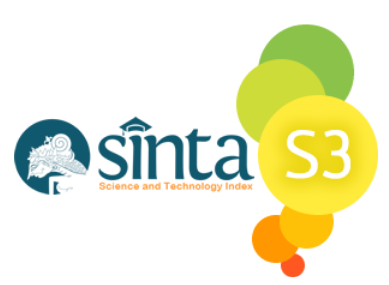ENHANCING STUDENTS’ CONCEPTUAL COMPREHENSION AND SELF-EFFICACY ON EXPONENTIAL FUNCTION USING THE REACT STRATEGY: A QUASI EXPERIMENT ON TENTH GRADERS IN BANDA SUB-DISTRICT
Abstract
This study comprehensively examined the improvement in the conceptual comprehension and self-efficacy of high school students on exponential functions through the REACT strategy. This quasi-experimental study employed a non-equivalent control group design. This study’s population was the tenth graders in Banda District, Central Maluku Regency, during the 2020/2021 school year. Data were collected using several instruments: a concept comprehension ability test, self-efficacy questionnaire, and observation sheet. Quantitative data analysis was performed to examine if there is (1) an increase in the conceptual comprehension and self-efficacy of tenth graders taught using the REACT strategy on exponential function material, (2) an increase in the conceptual comprehension and self-efficacy of tenth graders taught using the conventional method on exponential function material, (3) a difference in the conceptual comprehension and self-efficacy of tenth graders taught using the REACT strategy compared to those taught using the conventional method on the mastery of exponential function. Data analysis showed the following findings. (1) There was an increase in the conceptual comprehension of students in the experimental class taught using the REACT strategy with an n-gain index of 0.82 (very high). The average final score of conceptual comprehension was 87.91, which was categorized as very good. Besides, there was an increase in the self-efficacy from intermediate to very high in the experimental class after learning using the REACT strategy. The average student self-efficacy score increased from 60.59 to 91.25. (2) There was an increase in the conceptual comprehension of students in the control class taught using conventional learning with a gain index of 0.37 (intermediate). The average final score of conceptual comprehension was 60.25 within the fair category. Meanwhile, there was no increase in self-efficacy in the control class, indicating that students remained at an intermediate level with an average score of 62.87 to 61.98. (3). A significant difference was found in the conceptual comprehension and self-efficacy between the experimental and control class, represented by the results of the t-test.
Keywords
Full Text:
PDFReferences
Arikunto, S. 2013. Manajemen Penelitian. Rineka Cipta, Jakarta.
Choiriyah, Eka N.J.Isti. 2017. Pengembangan Pembelajaran Matematika Berbasis Masalah Dengan Strategi REACT Untuk Meningkatkan Pemahaman Relasional Siswa. Thesis (Undergraduate). Diterbitkan. Surabaya: UIN Sunan Ampel
Santrock, J. W. (2009). Psikologi Pendidikan. Jakarta: Salemba Humanika
Sudjana, Nana. 2013. Dasar-Dasar Proses Belajar Mengajar. Bandung: Sinar Baru Algesindo
Ruzzana, Davtyan. 2014. Contextual Learning. USA: ASEE Zone I Conference, University Of Bridgeport.
Sundayana, Rostina. 2014. Statistika Penelitian Pendidikan. Bandung: Alfabeta
Sugiyono. 2017. Metode Penelitian Kuantitatif, Kualitatif, dan R&D. Bandung : Alfabeta
Sunaryo, Yoni. 2017. Pengukuran Self-Efficacy Siswa Dalam Pembelajaran Matematika di Mts N 2 Ciamis. JUrnal Teori dan Riset Matematika (TEOREMA) Vol. 1 No. 2
Zulkarnain, Iskandar & Sari. A, Noor. 2014. Model Penemuan Terbimbing dengan Teknik Mind Mapping untuk Meningkatkan Kemampuan Pemahaman Konsep Matematis Siswa SMP. Jurnal Edu-Mat, Vol. 2 No. 3.
DOI: https://doi.org/10.18551/erudio.8-2.1
Refbacks
- There are currently no refbacks.
Copyright (c) 2021 Erudio Journal of Educational Innovation

This work is licensed under a Creative Commons Attribution 4.0 International License.












